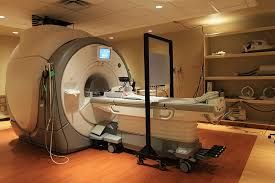Sleep
Poor Sleep Affects Children’s Thoughts and Emotions
Brain imaging shows which areas are involved.
Posted April 4, 2014
It has long been known that sleep deprivation impacts cognitive tasks including attention, learning, and memory. These tasks depend on efficient functioning of an area of the brain responsible for executive processing and working memory, the prefrontal cortex. Activity in the prefrontal cortex and connectivity with the amygdala underlies processing of information that has emotional meaning. In sleep research, theory development is strengthened when consilience is achieved when observational and behavioral findings are supported by measures of physiological structures and functions. Recent breakthroughs have been achieved by researchers who have been using brain imaging techniques to understand physiological mechanisms underlying relations between sleep, cognition, and emotion. One such study was published recently in the journal Sleep.

An fMRI machine
Using functional magnetic resonance imaging (fMRI), Kheirandish-Gozal and colleagues at the University of Chicago compared a group of 7-11 year old children with diagnosed obstructive sleep apnea with a control group. Children performed two types of tasks: one was cognitive (Stroop color-word task) and the other was a task measuring empathy. Children were shown two types of scenarios depicting either someone getting harmed or neutral events. On the cognitive task, accuracy of children in the two groups were comparable, but children with obstructive sleep apnea showed greater activation in brain areas involved in cognitive control and attentional allocation—implying that their brains were “working harder” to complete the task. On the empathy task, children with obstructive sleep apnea showed less amygdala activity reflecting a less empathic response. While numerous fMRI studies are being conducted with adults, this study is the first to identify neural mechanisms that are different in children with severe sleep problems.
It has always been easy for me to engage any audience when I am speaking about the effects of poor sleep on cognition and emotion in children. Everyone who has slept poorly for one or more nights knows a frequent result: thinking is sluggish and inefficient, and irritability ensues. We are beginning to understand that when children get sleep of insufficient duration or quality, their performance at school suffers both academically and behaviorally. The fMRI study adds another dimension to the growing understanding of how sleep loss affects the brain.
Concerns about children’s poor school performance and poor emotional control are voiced regularly by educators and parents. Getting better sleep is one route to addressing these concerns. Just as it is difficult to have children to get adequate nutrition and exercise, getting them to sleep better is no easy task. Even in the face of vigorous resistance, considerable momentum has been achieved by the grass-roots movement to move school start times later, particularly for adolescents who are experiencing sleep phase delay. Starting school later in the day will help, but it is not enough. We must also change lifestyle customs driven jointly by schools (e.g. school night sporting events and other activities; zero period classes) and by parents and children (e.g. insufficient monitoring of bedtimes; excessive media use; caffeine consumption). The cultural changes that have resulted in children sleeping less have been gradual and insidious. Habits of individuals, families, and organizations do not change easily or rapidly. But if we want our children and adolescents to perform optimally, some of those habits must be changed.
Reference
Kheirandish-Gozal, L., Yoder, K., Kulkarni, R, Gozal, D., & Decety J. (2014). Preliminary functional mri neural correlates of executive functioning and empathy in children with obstructive sleep apnea. Sleep, 37,587-592.


